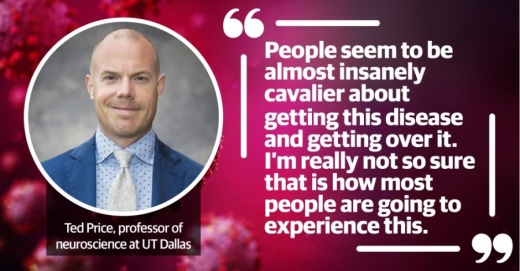In a June 1 study published in the science journal Brain, Behavior, and Immunity, Dr. Ted Price—a professor of neuroscience—and his colleagues point to a neuroimmune interaction as the driving force behind certain COVID-19 symptoms, such as headaches, delirium and bodily aches and pains, many of which they suspect could have long-term neurological issues.
“These kinds of things often lead people to have fairly debilitating and lasting symptoms after they so-called 'recover,'” he said. “But the truth is, in many ways, they don’t ever really recover.”
There are historic examples of patients with novel infectious diseases going on to suffer from unexpected health impacts, Price said. Chicken pox, for instance, leaves many people with a painful neuropathic condition, he said, called postherpetic neuralgia—a common complication of shingles.
“It was basically untreatable until we had a vaccine for it,” Price said. “And that took a long time.”
COVID-19 is plaguing the American health care system. There are now more than 3.4 million positive cases of the disease and nearly 35,000 coronavirus-related hospitalizations nationwide, according to the Centers for Disease Control and Prevention
What concerns Price, though, is whether the nation is equipped to handle the aftermath of the virus.
“Given how extraordinarily widespread this disease has now become in the United States, I’m, frankly, pretty terrified that we’re going to have people that have really long-lasting medical problems in numbers that we may not be able to deal with,” he said.
There are FDA-approved anti-inflammatory drugs, such as those for rheumatoid arthritis, that could reduce immune cell production and serve to stymie the interaction, Price said. Ongoing clinical trials should determine whether those drugs, in combination with other medicines, could act as a viable course of treatment for patients with COVID-19, he added.
“I think we will get an idea probably in the next month to two months about whether any of them actually work,” he said.
Despite this discovery, Price said there are likely many factors driving the rapid acceleration of COVID-19. He hopes people view his study as a cautionary tale about the potential long-term consequences of the virus.
“People seem to be almost insanely cavalier about getting this disease and getting over it,” he said. “I’m really not so sure that is how most people are going to experience this.”





